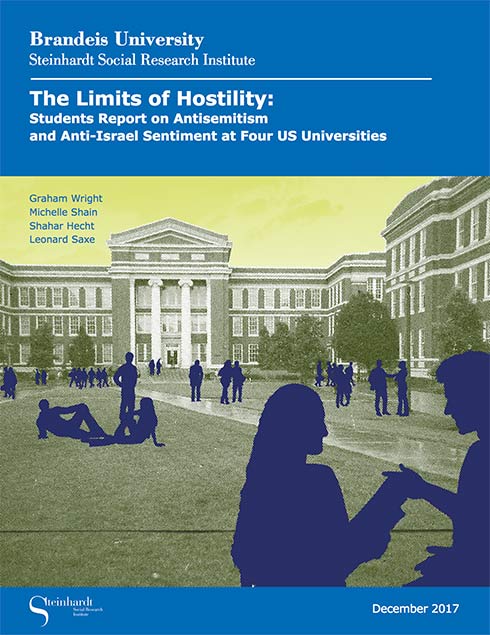The Limits of Hostility: Students Report on Antisemitism and anti-Israel Sentiment at Four US Universities
Graham Wright, Michelle Shain, Shahar Hecht, and Leonard Saxe
December 2017
 This report is part of a program of research focusing on undergraduates and their perceptions and experiences of antisemitism and anti-Israel hostility on US campuses. This report examines four institutions, Brandeis University, Harvard University, the University of Pennsylvania (Penn), and the University of Michigan, Ann Arbor (Michigan). The report draws on survey data collected in the 2015-16 and 2016-17 academic years from representative samples of undergraduates (both Jewish and non-Jewish) at these schools.
This report is part of a program of research focusing on undergraduates and their perceptions and experiences of antisemitism and anti-Israel hostility on US campuses. This report examines four institutions, Brandeis University, Harvard University, the University of Pennsylvania (Penn), and the University of Michigan, Ann Arbor (Michigan). The report draws on survey data collected in the 2015-16 and 2016-17 academic years from representative samples of undergraduates (both Jewish and non-Jewish) at these schools.
Key Findings
Expand All
The majority of Jewish students at the four schools studied reported that they had not experienced any form of discrimination at their schools due to their religion. In addition, the vast majority reported that they had not personally heard any of a number of antisemitic remarks with any frequency.
The majority of Jewish students at all four schools disagreed that their campus constituted a “hostile environment toward Jews.” Non-Jewish students at all four schools echoed this view. Compared to the other three campuses, both Jewish and non-Jewish students at Michigan were the most likely to agree that there was a hostile environment toward Jews on their campus, although this view was still a minority opinion among students.
tudents were more likely to agree that there was a hostile environment toward Israel on their campus than that there was a hostile environment toward Jews, but most students still disagreed with the former. The exception was at Michigan, where just over half of Jewish students agreed to any extent that the school had a hostile environment toward Israel.
At each of these schools support for an academic boycott of Israel was virtually nonexistent among Jewish students and was rare among non-Jewish students.
At the four schools examined, issues related to Israel and Jews were far down the list of “pressing issues” on campus—even among Jewish students.
Overwhelmingly, Jewish students at each of the campuses reported feeling safe on their campus. They were also more likely to feel that they “belonged” at their institution than non-Jewish students. The difference was largest at Michigan, suggesting that, while some Jewish students were exposed to antisemitic rhetoric and to anti-Israel hostility, these encounters did not seem to fundamentally alter the students’ experiences on campus.
 This report is part of a program of research focusing on undergraduates and their perceptions and experiences of antisemitism and anti-Israel hostility on US campuses. This report examines four institutions, Brandeis University, Harvard University, the University of Pennsylvania (Penn), and the University of Michigan, Ann Arbor (Michigan). The report draws on survey data collected in the 2015-16 and 2016-17 academic years from representative samples of undergraduates (both Jewish and non-Jewish) at these schools.
This report is part of a program of research focusing on undergraduates and their perceptions and experiences of antisemitism and anti-Israel hostility on US campuses. This report examines four institutions, Brandeis University, Harvard University, the University of Pennsylvania (Penn), and the University of Michigan, Ann Arbor (Michigan). The report draws on survey data collected in the 2015-16 and 2016-17 academic years from representative samples of undergraduates (both Jewish and non-Jewish) at these schools.